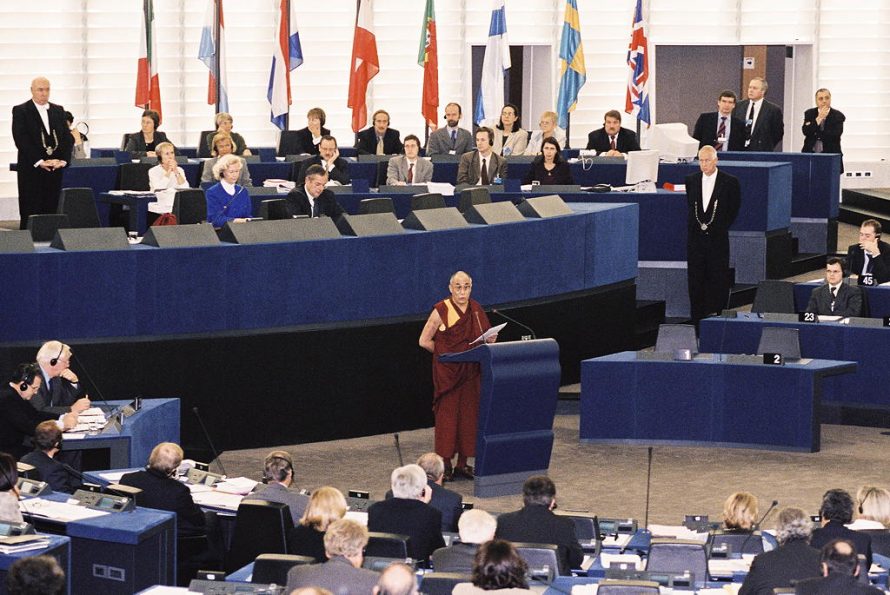
The European Parliament has been at the forefront of any EU initiative supporting the Tibetan cause and the non-violent struggle of the Dalai Lama. It has consistently advocated for a peaceful resolution of the divergences between the Dalai Lama and the Chinese government through dialogue, and for the establishment of a true, genuine autonomy for Tibet, thus allowing Tibetans to have religious and cultural freedom.
In 1988, the European Parliament became the first parliament in Europe to allow the Dalai Lama to address an official meeting on Tibet, despite strong protests from the Chinese government. On 15 June, a year after he presented a Five-Point Peace Plan for the restoration of peace and human rights in Tibet at the U.S. Congressional Human Rights Caucus in Washington, D.C, the Dalai Lama was invited for the first time to the European Parliament in Strasbourg, where he elaborated on this plan, proposing a concrete framework of negotiations and the creation of a self-governing democratic Tibet “in association with the People’s Republic of China”.

Since then, the European Parliament has been a crucial platform to discuss Tibet issues and promote the respect for the human rights of Tibetans – including their right to preserve their unique identity and religious and cultural traditions – and support constructive dialogue between the government of the People’s Republic of China and the Dalai Lama’s envoys. The Tibetan spiritual leader and Nobel Peace Prize laureate – who stepped down from his political role in favor of an elected leader-in-exile in 2011 – has been invited to address the parliament a number of times, including in 1996, 2001, 2008 and most recently in September 2016; despite Chinese pressure on the EU to prevent these meetings, he held discussions with European Parliament President Martin Schulz and members of the Foreign Affairs Committee, to whom he reaffirmed his strong admiration for the European Union.
Hearings, exhibitions and conferences on Tibet have also been regularly held in the European Parliament both in Strasbourg and Brussels, often at the initiative of dedicated MEPs and members of the Tibet Intergroup (TIG, see below). In March 2016, the Subcommittee on Human Rights (DROI), for example, invited Golog Jigme – a Tibetan monk jailed three times between 2008 and 2012 for involvement in the documentary film “Leaving Fear Behind” before escaping to India – to testify about the torture he was subjected to in custody and pressure the EU to challenge China’s oppressive policies in Tibet. In January 2018, Lobsang Sangay, President of the Central Tibetan Administration, was also heard in DROI, where he urged the EU to support the “Middle Way Approach”, which calls for genuine autonomy for Tibet under the sovereignty of the PRC. And in November that year, a conference on the issue of lack of access to Tibet and reciprocity in EU-China relations organized by the International Campaign for Tibet was hosted in the European Parliament in Brussels by Vice- President of the DROI Committee Cristian Dan Preda and Chairman of the TIG Thomas Mann.
In the past 30 years, the European Parliament has passed around 50 resolutions on Tibet – and on China or on human rights, including Tibet (a list is available). Some of these resolutions have raised concerns about the human rights situation in Tibet (including restrictions on religious freedom, repression of the 2008 uprising, self-immolations, the undermining of the Tibetan language…), while others focused on the EU’s policy on Tibet or specific individual cases (such as the Panchen Lama in 1995, Tenzin Delek Rinpoche in 2002 or Tashi Wangchuk and the monk Choekyi in 2018). Many of the resolutions also called for the continuation – or since 2010 the resumption – of the dialogue between the Chinese government and the representatives of the Dalai Lama.
In addition to these Tibet/China-specific resolutions, concerns about the situation in Tibet have also been included in other more general work of the European Parliament, such as its annual Report on Human Rights and Democracy in the World or reports on the state of EU-China relations.
The Dalai Lama’s Strasbourg proposal
1 Transformation of the whole of Tibet into a demilitarized zone of peace and non-violence
2 Abandonment of China’s population transfer policy, which threatened the very existence of the Tibetans as people
3 Respect for the Tibetan people’s fundamental rights and freedoms
4 Restoration of and protection of Tibet’s natural environment and abandonment of China’s use of Tibet for the production of nuclear weapons and dumping of nuclear waste
5 Commencement of earnest negotiations on the future status of Tibet and of relations between the Tibetan and Chinese people